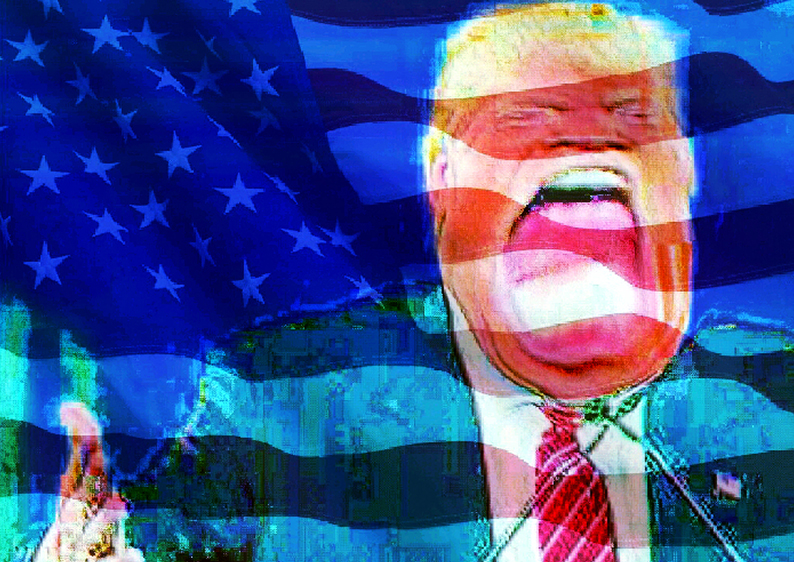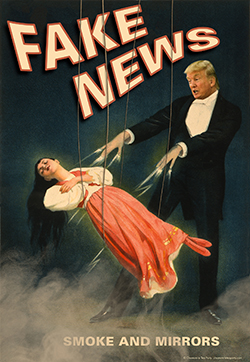
Trust is at the heart of recent political upheaval in US politics (and indeed in the UK). Trust is the suspension of doubt about an action in the face of vulnerability and incomplete or uncertain information. While signs of Donald Trumps’ gung-ho personality and Ill-disciplined use of Twitter were prevalent during the election this did not deter voters from supporting him. Trust in politics is complex beyond the personality of political candidates, but can shed some light into the emergence of Trump, as well as on the potential direction of travel of his politics and those unfolding in Europe.
In the US, as elsewhere, trust in the establishment has been in decline since the 1970s. In the US this period marks the end of the capitalist dream of upwardly mobile America in which anyone can have a good standard of living. As industries declined and the effects of globalisation impacted on US industries, large segments of the US electorate experienced reduced standards of living, health care and job prospects. Such changes lead to feelings of insecurity and fear about the future. Meanwhile, the rich are seen to become richer with the poorest struggling to make ends meet. Successive US governments have failed to address this. Instead of investing in industry, education, health care and addressing the issues in deprived communities, campaigning within US elections is often determined by simple issues such as ‘tax cuts’. These benefit the rich substantially more and do not significantly alter the landscape of hardship and insecurity many US citizens are experiencing. The US has a history of presidential candidates who emerge from the rich elite sections of society and understandably, after repeated disappointment with things not changing, the electorate has lost trust in the promises of establishment politicians. Barack Obama seemed to promise the long-needed change but his presidency ultimately failed in achieving this. This was owing to Senate politicking and Republican partisanship in blocking his reforms.
 A special role was played by the media, in particular the social media, with assistance from data driven communication by social media companies. These target Facebook users based on psychological profiling from Facebook. Data driven communication ensures that political messages are targeted to the people most likely to be influenced by them. It is through this process that social media not only gave a voice to the frustrations of a downtrodden US population but also permitted the rapid dissemination of fake news, and anti-establishment messages. With establishment figures detested and untrusted prior to the election, fake information about Hilary Clinton (including information that was not fake) confirmed doubt about her as a person and led to her losing vital support in key states. Meanwhile Trump’s campaign was fought on two main campaign fronts: undermining trust in the opposition and providing his supporters with a narrative for their suffering (e.g. the political swamp in Washington, immigration, a perceived Muslim threat, America not great any longer). While evidence for most of his claims is still completely missing or easily shown to be false, it had the effect exploited by snake oil sellers; of creating the need for a cure seen to combat the fears (the wall, make America great again, register Muslims). Trump’s campaign enlarged the fears of sections of the electorate, and then exploited the lack of trust in the established political system. It undermined it further via fake news and by capitalising on reports of his opponents’ impropriety. To divert from his own lack of trustworthiness, he employed gas-lighting, ie getting people to doubt their own perspective, and denial. Minimisation/normalisation were also used to dismiss allegations about his own conduct and replacing any concerns about this with narratives of fear and loss of identity.
A special role was played by the media, in particular the social media, with assistance from data driven communication by social media companies. These target Facebook users based on psychological profiling from Facebook. Data driven communication ensures that political messages are targeted to the people most likely to be influenced by them. It is through this process that social media not only gave a voice to the frustrations of a downtrodden US population but also permitted the rapid dissemination of fake news, and anti-establishment messages. With establishment figures detested and untrusted prior to the election, fake information about Hilary Clinton (including information that was not fake) confirmed doubt about her as a person and led to her losing vital support in key states. Meanwhile Trump’s campaign was fought on two main campaign fronts: undermining trust in the opposition and providing his supporters with a narrative for their suffering (e.g. the political swamp in Washington, immigration, a perceived Muslim threat, America not great any longer). While evidence for most of his claims is still completely missing or easily shown to be false, it had the effect exploited by snake oil sellers; of creating the need for a cure seen to combat the fears (the wall, make America great again, register Muslims). Trump’s campaign enlarged the fears of sections of the electorate, and then exploited the lack of trust in the established political system. It undermined it further via fake news and by capitalising on reports of his opponents’ impropriety. To divert from his own lack of trustworthiness, he employed gas-lighting, ie getting people to doubt their own perspective, and denial. Minimisation/normalisation were also used to dismiss allegations about his own conduct and replacing any concerns about this with narratives of fear and loss of identity.
A combination of Republican indecision and tolerance of Trump, in addition to the effect of social media filter bubbles, ensured that Trump garnered the support of enough voters to win key states. There are questions about the roles of non-US agencies meddling in the campaign and the role of John Comey, the Director of the Federal Bureau of Investigation, in undermining Hilary Clinton’s campaign by reopening an investigation into her emails at the last minute. Disillusioned by the political campaigning and the perception of a political establishment that was essentially seen as corrupt, many democrat voters may have been too turned-off by the infighting within the Democratic Party and the degraded trustworthiness of Hilary Clinton to come out in sufficient numbers or have voted for other candidates. The next four or eight years will be a markedly different stage of world history as a result. As far as the first few weeks of Trump’s presidency are concerned, they suggest that the level of untrustworthiness in the political establishment is going to reach a new level, when there seems to be a lack of political will to enforce constitutional controls (for example the emoluments clause requiring presidents to discharge all of their commercial interests).
It would be dangerous to dismiss Trump’s tweeting as the mutterings of a mentally challenged politician. With truth currently being stranger than fiction, similarly to all good action movies that have evil overlords, the baddies usually tell the hero of the movie what their cunning plan is. As horrific as the policy declarations announced by Trump are, we would do well not to doubt his or his associates’ intentions, or the direction of travel of his increasingly despotic government. Trust worked for Donald Trump because there was so little trust in the political establishment to begin with. It may also be what unravels him in the end – a lack of trust by those in his administration. The public may come to trust that his rhetoric is not mere positioning but declarations of intention. This may lead to greater resistance to his plans and a wider recognition that trust needs to be re-established by listening to the needs of the electorate and by creating systems of good governance and political debate. Finally, looking at the role of social media in the US election, there are also fundamentally important questions about the power of social networks and, in particular, the organisations paid by political agencies to use personality insights gained from Big Data, to manipulate users and undermine trust.













Rate and Review
Rate this article
Review this article
Log into OpenLearn to leave reviews and join in the conversation.
Article reviews